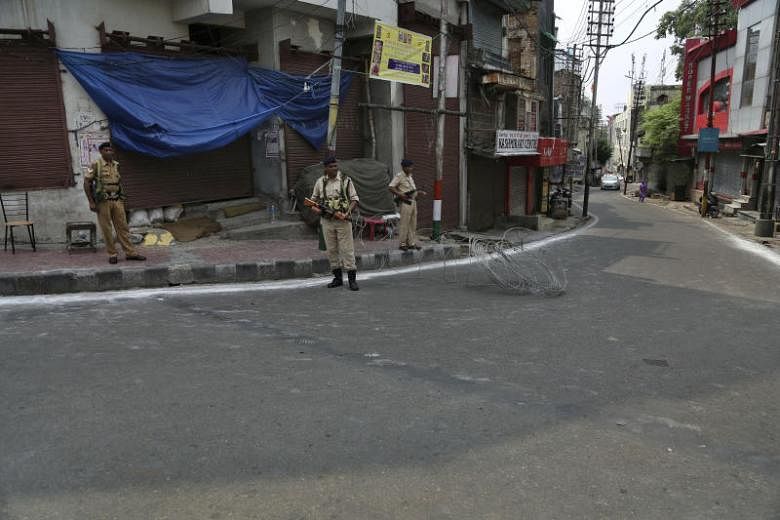NEW DELHI - India will witness limited diplomatic fallout over its decision to bifurcate Jammu and Kashmir and remove Kashmir's special status, according to Indian foreign policy analysts, who also said that New Delhi would be able to withstand any blowback.
China has criticised India's decision to bifurcate the territory, which borders China, and accused India of undermining territorial sovereignty over Ladakh.
Ladakh has been carved out from the rest of Jammu and Kashmir into a Union Territory under the new changes.
Pakistan, China's close ally, has also hit out at India, with Pakistan president Arif Alvi saying that the change in status for Kashmir went "against wishes of the Kashmiri people".
Pakistan President Imran Khan said that Pakistan was considering approaching the United National Security Council.
"We will fight it at every forum. We're thinking how we can take it to the International Court (of Justice)... to the United Nations Security Council," Mr Khan said in an address to Pakistan's Parliament.
Pakistan has also reached out to friendly countries over the Indian decision, gaining support from Malaysia and Turkey, according to reports in Pakistani media. It has also approached the Organisation of Islamic Cooperation.
The latest diplomatic row over Kashmir comes after the government on Monday (Aug 5) announced the bifurcation of the state and withdrew Kashmir's special status, which had guaranteed a high degree of autonomy to the region, including a separate flag and protection from property purchases by non-residents.
In an effort to explain the move, Indian diplomats in New Delhi and in missions abroad briefed their counterparts from a number of countries on its decision to reverse a policy that has been in place for over seven decades.
Other countries have also reacted, with the United States called for "peace and stability" along the de facto border between India and Pakistan and questioning the detentions of state leaders by India, though it stopped short of censure.
"We are concerned about reports of detentions and urge respect for individual rights and discussion with those in affected communities," said Ms Morgan Ortagus, spokesman for the US State Department.
The United Arab Emirates, an important voice in the Arab world, has come out in support of India's changes, saying it is an "internal matter of India", as did neighbouring Sri Lanka.
Indian foreign policy analysts noted that Pakistan's efforts to internationalise the Kashmir issue and China's reaction would have little impact on India, which has has called the changes an internal issue.
"It would look like that, firstly, Pakistan will spearhead the diplomatic offensive against India. We can now expect China to give Pakistan support. The question mark is over what stand the US will take. So far, the US has maintained a neutral position," said former Indian foreign secretary Lalit Mansingh.
"We should expect some reactions from the UN. But I am confident there will be no major diplomatic issues for India. It is an internal matter."
"They (the Modi government) have got the mandate to do it. What adds credibility is that most of the parties have supported the government, even those opposed to the Bharatiya Janata Party (BJP)."
The BJP's opponents, such as the Telugu Desam Party and Aam Aadmi Party, have come out in support of the Kashmir move.
Many have also noted the timing of the move. It comes immediately after US President Donald Trump, during the visit of Mr Khan to Washington last month, said Mr Modi had asked him for mediation on Kashmir.
India later denied it had asked for mediation and the State Department also backtracked, saying the US is there to help if both sides want it.
Pakistan has long sought a third party to mediate on Kashmir, but India has maintained it remains a bilateral issue.
Some anticipated heightened tensions along the Line of Control, the de facto border between India and Pakistan.
Mr Sameer Patil, Fellow, International Security Studies, Gateway House, said, "India can expect heightened action on the Line of Control, exceeding the scale of exchange of artillery fire and infiltration activities seen in recent days."


